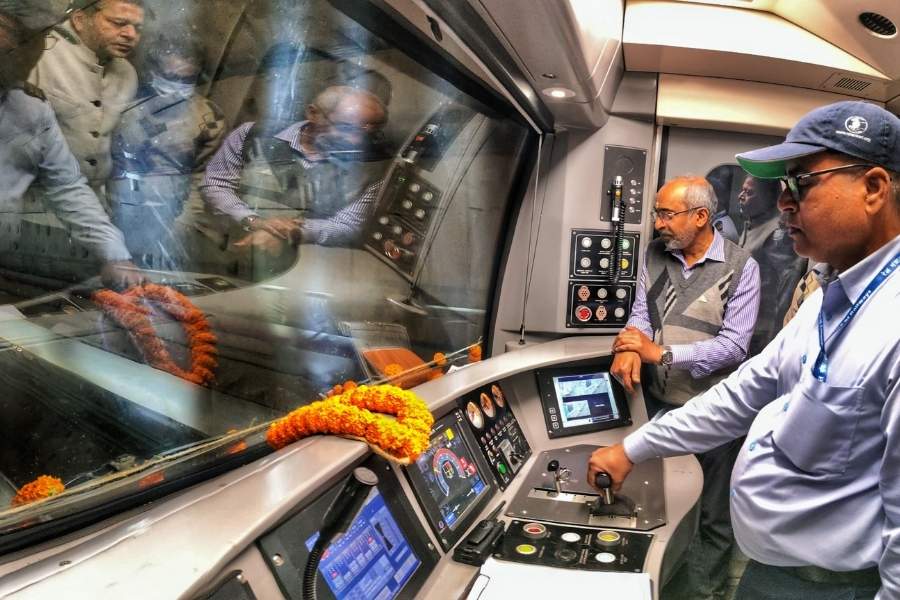 Wednesday, 22 January 2025
Wednesday, 22 January 2025
 Wednesday, 22 January 2025
Wednesday, 22 January 2025
Mamata Banerjee rose as a leader from the streets through her protests and mass movements, often facing bullets and attacks that even put her life in danger.
The Bengal chief minister admitted as much on Saturday, during her unannounced visit to the Swasthya Bhavan protest site in Salt Lake.
"Even I have come from the students' movement and have suffered a lot. I understand the pain and I support protests," she told the junior doctors on protest since the rape and murder of the postgraduate trainee doctor at the state-sun RG Kar Medical College & Hospital.
She sought to connect with the protesters and convince them of her sympathies for their angst.
The Telegraph Online looks at the protests that Mamata Banerjee led over the years, transforming her from a firebrand leader to the chief minister who brought down the 34-year stranglehold of the Left on Bengal politics.
1975: Mamata Banerjee’s protest against Jayaprakash Narayan
August 25, 1975. It was the peak of the Emergency. Jayaprakash Narayan, the face of the anti-Emergency movement, visited Calcutta to lead a protest against the government.
As Narayan’s convoy entered the city at around noon, Congress supporters including Banerjee, a student then, blocked his path. Reportedly, Banerjee climbed onto the bonnet of JP’s white Ambassador car and threatened to hang herself.
This happened when the veteran Gandhian politician sat inside the car.
1990: Hazra protest
On August 16, 1990, Mamata led a Congress rally on Hazra Road during a strike when CPM workers attacked her. A picture of that day shows a man – later identified as Lalu Alam, brother of a DYFI leader – trying to hit her with a stick while an old, frail man tries to save Mamata. The hit fractured her skull, and she was hospitalised for a month.
But Mamata bounced back, to tackle the organisational behemoth CPM with renewed vigour. When Mamata came to power in 2011, Alam apologised for the 1990 attack .
1993: When Mamata was dragged by her hair from Writers’ Buildings
January 7, 1993. It was a chilly afternoon in Calcutta. The Jyoti Basu-led CPM government was entrenched in power and the satraps of his party had spread their tentacles all over Bengal. Mamata Banerjee, who was then in her late thirties, sat in protest right in front of chief minister Basu’s office. She was accompanied by a deaf-mute girl from Nadia district. Allegedly, a CPM cadre had raped her.
Banerjee did not pay heed to requests by senior government officials and police officers and remained stationed near the chief minister’s chamber. It was around 4.30pm and Basu was about to reach his office. Cops forcibly removed Banerjee and the victim, dragging them by their hair. Banerjee kept screaming until cops put her into the police van and took her to Lalbazar, the Calcutta police headquarters.
The July 21 firing
On July 21, 1993, Mamata Banerjee, who was then the state Youth Congress leader, led a protest march to Writers’ Buildings in Kolkata demanding photo identity cards for voters to stop false voting.
Chaos ensued and led to police firing. A total of 13 Congress workers died. This became a turning point in Banerjee’s political career. Till today, July 21 is commemorated as Shaheed Diwas (Martyrs’ Day) by the Trinamul.
(2006-2008): Singur Movement
In May 18, 2006, Mamata Banerjee took up the cause of farmers in Singur, Hooghly district, where the Bengal government was acquiring land for Tata Motors’ for Rs 1 lakh small-car project eventually named the Nano.
Banerjee went to Singur to protest. She was forcibly evicted from the Singur police station as she sat on a dharna. Banerjee then led a 26-day hunger strike in Calcutta’s Esplanade. Her hunger protest continued against land acquisition in Singur. The protests and political negotiations continued till the time Ratan Tata abandoned his dream car project in Singur and shifted to Sanand, Gujarat.
(2007-2008): Nandigram Protest
On March 14, 2007, police fired on villagers protesting against land acquisition for a chemical hub in East Midnapore’s Nandigram. A total of 14 people died. Mamata Banerjee was the first one to lend her voice to the Nandigram protests. The resistance started soon and continued for years with Nandigram almost becoming a ‘liberated zone’ where the writ of the state administration did not run.
2008: Bhumi Uchhed Pratirodh Committee (BUPC)
Mamata Banerjee, supported the Bhumi Uchhed Pratirodh Committee (BUPC), which opposed land acquisition for industrial projects. The BUPC was backed by various left-wing and civil society groups.
Singur and Nandigram became the Battle of Waterloo for the CPM. Mamata rode on the success of her protests and evicted the CPM from the Writers’ Buildings, the same place from where the Jyoti Basu-led government had evicted her in 1993.







